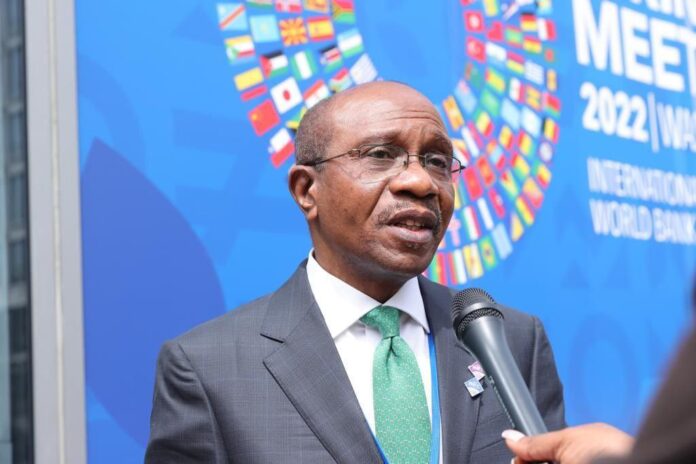Godwin Emefiele, former governor of the Central Bank of Nigeria (CBN), has lost his bid to dismiss the charges against him in the ongoing $2.1 billion foreign exchange allocation case. On Wednesday, a Lagos special offences court ruled that the trial would proceed, dismissing Emefiele’s legal objection to the court’s jurisdiction over the case.
Emefiele, who is facing a 26-count charge filed by the Economic and Financial Crimes Commission (EFCC), was accused of allocating foreign exchange totalling over $2.1 billion without following proper bidding procedures. This allocation was reportedly made under his leadership at CBN, a move that the EFCC claims is prejudicial to Nigeria’s national interests.
The charges against Emefiele revolve around allegations of abuse of office, with the EFCC accusing him of approving foreign exchange allocations in violation of established laws. According to the anti-graft agency, the lack of competitive bidding for such a large sum of money meant that Nigerians were deprived of the potential benefits that could have been garnered through a fair and open process.
Court Rejects Objection
During the proceedings, Emefiele’s legal team, led by Olalekan Ojo, argued that certain charges against him should be dismissed due to issues with the court’s jurisdiction. Specifically, Ojo sought to have counts one to four of the charges, which related to the alleged abuse of office, thrown out. The defense argued that the acts cited in those counts were not legally recognized offenses under Nigeria’s constitution, citing Section 36(12) of the 1999 Constitution (as amended), which outlines legal provisions related to abuses of office.
In his ruling, Justice Rahman Oshodi, who presided over the case, sided with the prosecution on the issue of jurisdiction. He noted that the EFCC had successfully demonstrated the court’s territorial jurisdiction over the remaining charges, which concern the unlawful foreign exchange allocations, with evidence to support the claims.
“The objection challenging the court’s territorial jurisdiction over counts eight to 26 fails and is hereby dismissed,” Oshodi said. “The prosecution has established sufficient territorial nexus in this case.”
However, the court did rule in favor of the defense on counts one to four, which related specifically to the abuse of office charges. These charges were struck out on the grounds that the allocation of foreign exchange without a clear, justifiable reason is not categorized as a punishable offense under Nigerian law.
“Allocation of foreign exchange without reason is not defined as an offense in any written law,” Oshodi stated, explaining his decision.
The ruling marks a significant development in the high-profile case, as Emefiele, who was once a key figure in Nigeria’s financial sector, now faces the prospect of standing trial for the remaining charges.
EFCC’s Allegations and Trial Preparations
The EFCC’s case against Emefiele centers on his actions during his tenure at the helm of CBN, a period in which billions of dollars in foreign exchange were allegedly allocated to various parties without competitive bidding. The commission claims that these actions were in violation of the principles of transparency and accountability expected from such a critical position.
The trial is expected to delve deeper into how Emefiele exercised his powers as CBN governor and whether his decisions were consistent with legal and regulatory frameworks designed to safeguard Nigeria’s economy.
The court’s decision to dismiss Emefiele’s objection is seen as a major victory for the EFCC, which has been under increasing pressure to hold high-profile public officials accountable for corruption and financial mismanagement. However, the defense team remains resolute, signaling their intent to fight the case in court.
Olalekan Ojo, Emefiele’s lawyer, expressed his disappointment with the ruling, but he confirmed that the defense team would continue to challenge the charges. “We respect the court’s decision, but we are prepared to continue our fight in the coming trial dates,” Ojo said in a brief statement to reporters after the ruling.
Political and Public Reactions
The case has generated widespread public interest, given Emefiele’s former position as the governor of the Central Bank and his close involvement with Nigeria’s financial sector. Many Nigerians view the trial as a litmus test for the country’s commitment to tackling corruption at the highest levels of government.
Political analysts have pointed out that this case may have significant implications for the trust that Nigerians place in their financial institutions, particularly the Central Bank. The decision to continue the trial could also send a strong message about the need for greater transparency in the management of public funds.
Reacting to the ruling, an anonymous source close to the presidency said, “This is a positive step in ensuring that there is accountability in how public funds are managed, especially when it comes to crucial sectors like the financial system. We hope that this trial will serve as a deterrent for those in power who may consider misusing their authority.”
Critics, however, argue that the case highlights the deep-rooted issues of governance and the challenge of holding powerful figures accountable. Some have expressed concerns about the political motivations behind the trial, suggesting that Emefiele’s prosecution might be tied to broader political dynamics within Nigeria’s ruling elite.

